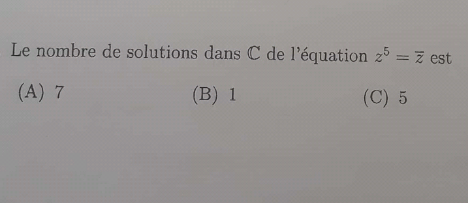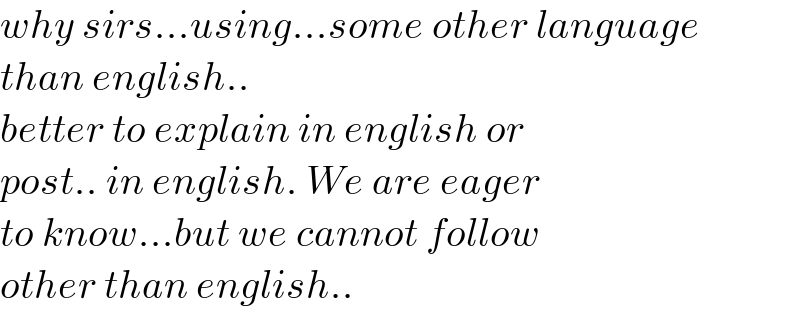Question Number 153769 by SANOGO last updated on 10/Sep/21

Answered by puissant last updated on 10/Sep/21
![On remarque que z=0 est solution de l′equation. supposons z≠0. En prenant les modules, on a: ∣z∣^5 =∣z^� ∣=∣z∣ ⇒ ∣z∣^6 =∣z∣^2 =1 d′ou ∣z∣^6 =1 alors z=e^((2ikπ)/6) =e^((ikπ)/3) , k∈[∣0;5∣] S_C ={0, 1, e^(i(π/3)) , e^(i((2π)/3)) , −1, e^(i((4π)/3)) , e^(i((5π)/3)) } Alors on a 7 solutions...](https://www.tinkutara.com/question/Q153770.png)
$${On}\:{remarque}\:{que}\:{z}=\mathrm{0}\:{est}\:{solution}\:{de}\: \\ $$$${l}'{equation}.\:{supposons}\:{z}\neq\mathrm{0}.\:{En}\:{prenant} \\ $$$${les}\:{modules},\:{on}\:{a}: \\ $$$$\mid{z}\mid^{\mathrm{5}} =\mid\bar {{z}}\mid=\mid{z}\mid\:\Rightarrow\:\mid{z}\mid^{\mathrm{6}} =\mid{z}\mid^{\mathrm{2}} =\mathrm{1} \\ $$$${d}'{ou}\:\mid{z}\mid^{\mathrm{6}} =\mathrm{1} \\ $$$${alors}\:{z}={e}^{\frac{\mathrm{2}{ik}\pi}{\mathrm{6}}} ={e}^{\frac{{ik}\pi}{\mathrm{3}}} \:,\:{k}\in\left[\mid\mathrm{0};\mathrm{5}\mid\right] \\ $$$${S}_{\mathbb{C}} =\left\{\mathrm{0},\:\mathrm{1},\:{e}^{{i}\frac{\pi}{\mathrm{3}}} ,\:{e}^{{i}\frac{\mathrm{2}\pi}{\mathrm{3}}} ,\:−\mathrm{1},\:{e}^{{i}\frac{\mathrm{4}\pi}{\mathrm{3}}} ,\:{e}^{{i}\frac{\mathrm{5}\pi}{\mathrm{3}}} \right\} \\ $$$${Alors}\:{on}\:{a}\:\mathrm{7}\:{solutions}… \\ $$
Commented by SANOGO last updated on 10/Sep/21

$${merci}\:{bien}\:{le}\:{dur} \\ $$
Commented by SLVR last updated on 11/Sep/21

$${why}\:{sirs}…{using}…{some}\:{other}\:{language} \\ $$$${than}\:{english}.. \\ $$$${better}\:{to}\:{explain}\:{in}\:{english}\:{or} \\ $$$${post}..\:{in}\:{english}.\:{We}\:{are}\:{eager} \\ $$$${to}\:{know}…{but}\:{we}\:{cannot}\:{follow} \\ $$$${other}\:{than}\:{english}.. \\ $$
